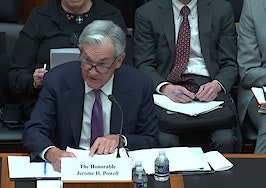In these times, double down — on your skills, on your knowledge, on you. Join us Aug. 8-10 at Inman Connect Las Vegas to lean into the shift and learn from the best. Get your ticket now for the best price.
Cyrus Mohseni leads a California brokerage with about 45 agents. And as the market has cooled this winter, one of them called to ask for help.
“He asked, ‘how do you stay motivated when nothing’s clicking,'” Mohseni recently told Inman.

Cyrus Mohseni
This particular agent had just done a listing presentation for the owner of a multimillion-dollar home. But the owner ultimately went with another agent. It was demoralizing, especially at a time when listings are particularly hard to come by.
But Mohseni — the founder and CEO of The Keystone Team — reframed the episode, pointing out that many “agents would die to have an appointment” with that kind of homeowner, even if they don’t get the listing in the end.
Just walking through the door, Mohseni, explained was a victory.
“I said, ‘it wouldn’t hurt so bad if you had more opportunities on the table. So how do we get more opportunities?'”
Mohseni recalled adding that he then compared real estate to the gym, which is one of the agent’s favorite pastimes.
“Sometimes when you hit the gym you don’t see the definition right away. But if you go every day, the results will come.”
The analogy implied that the same day-after-day dedication applies to working in real estate too.
The details of that conversation are unique to Mohseni and his agent, but the broad strokes probably look familiar to many real estate leaders who are currently having to guide agents through the biggest downturn in years. It’s a tough time, especially for agents who got into the business after the Great Recession and may have gone a decade or more without experiencing anything like the present.
And that means leaders like Mohseni have had to step up their game. To get a sense of just how they’re doing that, Inman recently published the first-ever Intel leadership survey. The survey was open between Feb. 27 and March 6 and garnered more than 700 responses. Survey questions focused on the state of the market, leaders’ feelings about their organizations and where industry members may invest their resources this year.
Inman published the full results of the survey last week exclusively for Intel subscribers. But to dig deeper, Inman also reached out to a group of respondents. What follows below is some of their best advice and takes on the market, along with a sample of the survey data.
The takeaway from these conversations was that the biggest challenges right now include a severe lack of inventory and the need to help agents stay on track when deals are scarce. However, despite those challenges, many industry members also argued that real estate is cyclical and that it’s possible to make it through — and even grow — this year.
It’s all about inventory right now
Mark Johnson is selling his home.
Johnson is the co-founder of agent recruiting firm CoRecruit and formerly president of JPAR and vice president at Tom Ferry International. He currently lives in California and just days ago put his own house on the market.
“We had eight showings in four days,” Johnson told Inman, adding that a slower market notwithstanding, he anticipates being in escrow shortly.

Glenda Feeken
The episode highlights a theme that came up in virtually every phone conversation Inman conducted for this story: Inventory is a challenge. Everyone who spoke with Inman said that there simply aren’t enough homes for sale in their local markets.
“There’s absolutely no inventory,” Glenda Feeken, who runs a two-person RE/MAX office in Kenai, Alaska, told Inman.
“In any market we only have so many homes. But we’re suffering the same problem everyone is, and that’s lack of inventory,” said Robert Nelson, executive managing director for Brown Harris Stevens in the Hamptons.
“That’s definitely what’s going on here, there’s hardly any inventory,” said Ashley Constans, of the Constans Heller Group in San Diego.
“There are still a lot of buyers out there, but unfortunately there’s not a lot of inventory,” Larry Rideout, chairman and founder of Gibson Sotheby’s International Realty in eastern Massachusetts, told Inman.
Inventory shortages have been a recurring issue throughout the coronavirus pandemic era and are what helped drive the brutal bidding war landscape of 2020 and 2021.
But the leaders who spoke with Inman for this story drew a key distinction between those years and the present: The previous issue was that low interest rates pumped up demand faster than supply could keep up. But now, higher interest rates are keeping sellers on the sidelines and thus creating new supply constraints.
Rideout’s comment, and Johnson’s experience selling his own home, highlight the outcome: Though rates are higher and affordability remains a problem for many buyers, the lack of homes means supply still isn’t meeting demand and thus prices aren’t actually going down in many markets.

Mark Roan
“Prices aren’t really dropping drastically due to the fact that inventory is so low,” Mark Roan, an agent with HomeSmart PV & Associates in Modesto, California, told Inman.
Patrick Shannon, the managing broker for Michael Saunders and Company in Sarasota, Florida, made a similar point adding things are so intense in his area that properties are “still seeing multiple offers.”
The survey results bear out such comments, with a plurality of respondents saying they expect the market to be worse in 2023 than it was in 2022. A majority of respondents, or 53.3 percent, also indicated that they think inventory will ultimately be flat this year.

Credit: Jim Dalrymple II
The overall takeaway from these comments was that leaders are having more and more experiences like the one Mohseni recounted about trying to help one of his agents. In other words, challenges right now in real estate include both helping agents find deals and also keeping them motivated in a slower time.
Rallying the troops
Inman asked the industry members who spoke out for this story how exactly they’re keeping their people engaged. Among them, Mohseni pointed to company culture and open communication.
“My advice for other leaders is probably to make sure that we’re there,” he said. We’re not just the support of the agent and their business. We’re the support for the agent and their life. They’ve put their trust in us. My advice for other leaders is to step up to the plate and be there for them.”

Patrick Shannon
Shannon pointed out that many agents joined the industry during the boom times of the last decade, and are consequently having “an eye-opening experience” right now. As a result, he holds weekly meetings with his agents. The company provides deep statistical information about the market. And team members even caravan out to properties together.
The point, he said, is that it’s important that agents understand what’s happening and how their leaders can help them.
“It’s important for us to educate our agents,” he added.
Johnson agreed, adding that even if leaders thought they were doing a good job communicating with their agents before, now is the time to do more and act with even greater empathy.
“As leaders we have to take charge, we have to step up,” he said. “And if you think you’re communicating well, challenge yourself. Ask, ‘can I communicate with more value.'”

Robert Nelson
Many of the leaders who spoke to Inman also stressed the importance of getting “back to basics” — which is a phrase that came up again and again. Nelson, for instance, said that in the Hamptons where he works, there are about 2,000 agents across various brands. The area is not large, and Nelson ultimately predicted that there won’t be enough deals to go around. This, he added, will likely lead to agents in his area leaving the industry this year.
But Nelson said agents who want to thrive at this time need to double down on communicating with clients. Likewise, their leaders have to help them understand what going back to basics actually means.
“Just keep on the phone,” he explained. “Keep up with your sphere of influence. Keep touching base with everyone.”
Many of the survey participants who spoke with Inman made similar predictions about the agent community, saying there will likely be too few deals for everyone and the number of practitioners is likely to shrink. In some cases that has already started to happen.

Ashley Constans
“I would say we are seeing an exodus of agents already, which is sad,” Constans said.
But there was a similar consensus that weathering the storm and finding deals was really all about turning to the grindstone day after day and doing the things that have always worked for real estate professionals.
“Check in with your clients, your past clients,” Feeken advised. “Anything that’s not sexy, you’ve got to do it. Business is not going to walk through the door.”
Growth isn’t out of the question
Though the industry members who spoke with Inman were largely in agreement that inventory is a major issue at the moment, some were surprisingly upbeat about their ability to grow this year.

Tom Kuntz
Among them, Tom Kuntz, executive vice president of Engel & Völkers Real Estate USA, told Inman that “our plans call for growth” in 2023.
“Our goal is to increase our number of locations and agents,” Kuntz said.
Kuntz was aware of the challenges and spoke at length about the slower market. But he also noted that even with a slower market, the total agent population is huge — meaning companies that want to expand can do so if they’re smart. And he added that Engel & Völkers is specifically looking to add both agents and offices in metropolitan areas of states, such as California and Florida.
Kuntz isn’t alone. Inman’s survey found that in total, about 33 percent of respondents want to grow their organizations this year. By comparison, 51 percent believe they will maintain consistent staffing levels.
Only 13 percent of respondents anticipate letting workers go in 2023 — which is a remarkable finding given that real estate layoffs have been widespread over the last year and ultimately resulted in thousands and thousands of job cuts.

Credit: Jim Dalrymple II
Rideout also believes growth in 2023 is possible and said that his company already expanded into a new market just last month. Asked how other leaders in the industry might replicate that success, he said “you have to be a company that people would want to join.”

Larry Rideout
“If you’re not attractive you’re not going to be able to grow,” he continued. “So what you have to do first is look in the mirror.”
His point was that companies need to focus on their culture and support. And he specifically suggested growing strategically into areas that won’t overextend a company’s grasp.
“Sit down and strategize where the market is and then start moving in that direction,” he said, noting that his company started in 2006 and grew from three offices with 50 agents to 27 offices with 500 agents even as the market moved up and down over the years. But it didn’t “grow just to grow. Our goal is if we’re impacting a market somewhere that’s where we’re looking.”
Asked about growth versus layoffs, Mohseni argued that the “reason you see a lot of companies that are downsizing is because they went way too aggressively, too fast.”
In Mohseni’s case, about 40 of his agents are in Southern California with another five in the state’s capital, Sacramento, up north. In the near term, Mohseni is planning on growing the number of agents in the Sacramento office. And in the end, he said that slower markets represent a chance to act.
“I think there are more opportunities in a market like this than in any other market,” he said. “The agents that come out of the other sides of these markets are top producers. When agents are leaving the industry, that gives you the opportunity to gain more market share.”













